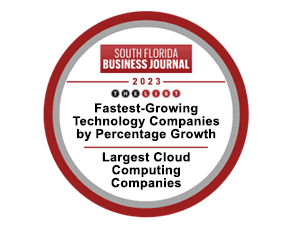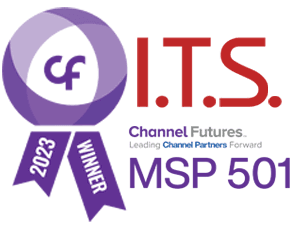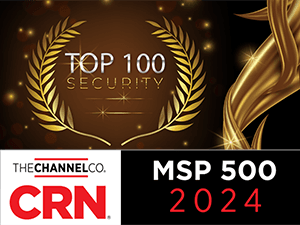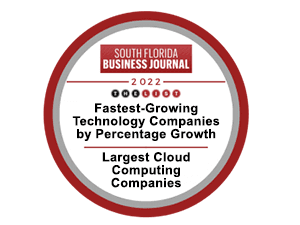frequently asked questions

Managed Services FAQ
Partnering with the right Managed Service Provider or MSP is a critical decision for your business. The Managed Service Provider you select will play a key role in managing your IT infrastructure, ensuring your cybersecurity, and providing friendly technical support to you and your team. Once selected, the right MSP will give you time to focus on the success of your business instead of worrying about IT efficiencies, regulatory compliance, or your computer network.
A Managed Service Provider or MSP is a company that offers a range of IT (Information Technology) and cybersecurity solutions to small and medium-sized businesses. The primary goal of a Managed Service Provider or MSP is to proactively manage and maintain the IT infrastructure of a business, ensuring small and medium-sized businesses operate efficiently and securely.
A Managed Service Provider or MSP can also serve as an outsourced IT Help Desk to assist employees at your business by answering all their technology related questions. Most Help Desk support is handled remotely by professional network engineers, especially when providing managed IT services for remote workforces. However, on-site IT support by professional network engineers is available.
In addition to providing outsourced IT Help Desk support for employees, a Managed Service Provider or MSP should offer cybersecurity training for you and your employees. A staggering majority of data breaches are caused by employees or executives carelessly clicking on a phishing email. Cybersecurity training is a critical service provided by a Managed Service Provider or MSP.
When choosing a Managed Service Provider or MSP for your company, there are 10 important factors to consider, including:
1. Does your MSP have the IT skills and expertise to support your business?
2. Does your MSP have reliable and friendly help desk support?
3. Does your MSP provide Managed IT Services with proactive monitoring?
4. Does your MSP provide Managed IT Services for your remote and hybrid workforce?
5. Does your MSP support your future business growth with scalable IT solutions?
6. Does your MSP guarantee service in writing with a Service Level Agreement?
7. Does your MSP provide and enforce robust cybersecurity services?
8. Does your MSP protect your business with IT disaster recovery services?
9. Does your MSP offer vendor management services?
10. Does your MSP share your values and fit your company culture?
IT Skills and Expertise
It is imperative to choose a Managed Service Provider or MSP with IT professionals who have years of experience and skills in network management, cybersecurity solutions, cloud integrations, help desk assistance, remote workforce support, disaster recovery, phishing simulations, cybersecurity education, and technology vendor management.
A reputable MSP will have a history of delivering quality service and measurable client satisfaction. Ask for references and then check those references, especially if the references are for notable companies or comparable to your business in size or industry.
Reliable and Friendly Help Desk Support
Experience and expertise are key indicators of a Managed Service Provider’s ability to support your organization effectively. However, extraordinary customer support is the mark of an exceptional MSP.
The right Managed Service Provider has a dedicated team of friendly network engineers and security professionals ready to meet your needs and exceed your expectations with pleasant and patient support over the phone or in person. Avoid any provider that talks down to your end users or consistently over their heads.
Managed IT Services With Proactive Monitoring
Your Managed Service Provider shouldn’t just be waiting for something to break so they can fix it. Rather, an MSP should have experience preventing problems before they become major IT issues, which saves your company money and reduces business downtime.
Proactive IT monitoring examines hardware, applications, security, technology trends, and internet connectivity to bolster both uptime and employee productivity. Your MSP should recommend ways to improve the security and performance of your IT network and provide a roadmap for future technology improvements.
Proactive communication is also important. An MSP that cares about your success (and their own), will take the time to engage with you regularly and ask for your feedback on help desk interactions.
Managed IT Services For Remote Workforces
It’s valuable for your Managed Service Provider to have experience supporting a host of work scenarios such as remote work, work from home, traditional office environments and a hybrid mix of all three. Each work type presents unique challenges and cybersecurity risks.
We all know work isn’t restricted by geographical locations or time zones anymore. A capable MSP enables your team to be more productive, collaborative, and efficient — on any device, at any time, and from anywhere in the world. That MSP also empowers your company to manage and protect your vital business information wherever it is being accessed.
Growth With Scalable IT Solutions
A good Managed Service Provider (MSP) will take time to understand your business’s unique qualities and be invested in your growth with scalable IT solutions. Scalable IT solutions ensure your IT infrastructure can adapt quickly as your business needs – and user count – change. And predictable billing based on your employee count makes budgeting for a growing staff simple.
Whether it's setting up your new employees with computers, expanding your IT infrastructure, or implementing new technology solutions, an MSP can rapidly adapt to your growth trajectory, ensuring your IT remains aligned with your business goals and growth.
Get It In Writing With A Service Level Agreement
A Service Level Agreement or SLA is the promise of your Managed Service Provider (MSP) to meet certain requirements such as response times, help desk ticket priorities, data recovery, and downtime. A top-tier MSP will provide you with an SLA and then work tirelessly to exceed the SLA standards.
Robust Cybersecurity Services Provider
It is vital your Managed Service Provider (MSP) provides cybersecurity services. The dangers of phishing, ransomware, and data breaches are both very real and rapidly growing, and they can lead to severe financial and reputational damage.
Cyber threats are constantly evolving, and attacks are ever-increasing. Proactive security measures such as constant intrusion detection, continuing cybersecurity education, and persistent phish testing will help safeguard your confidential business information.
Strict adherence to security policies is also crucial if your business ever needs to file a claim with your cybersecurity insurer. Successful claims are those that can withstand rigorous scrutiny from insurers keen to limit policy payouts.
IT Disaster Recovery Services
Disaster can come in all shapes and sizes and at any time. Potential disasters include cyberattacks, hurricanes, fire, flood or even the well-meaning employee who accidentally destroys critical files. Make sure your Managed Service Provider or MSP can restore your data in a matter of hours, not weeks. It’s also important to understand the quality of your backups. For your business continuity, make sure the integrity of your backups is tested and verified regularly.
Vendor Management From Your IT Partner
Don’t get stuck in the endless cycle of finger pointing between your IT company and a vendor such as your internet or phone provider. Choosing a Managed Service Provider that offers Vendor Management can relieve the pressure of this pain point. Vendor management also extends to the makers of your company’s most critical software, printing and copying partners, even security camera solutions.
Your MSP should be able to effectively communicate with your IT related vendors and expedite solving issues. A sharp MSP speaks the same language and knows when to escalate support. And because the MSP spends the time needed to troubleshoot vendor issues, your staff is free to keep working. The MSP also manages ongoing relationships with those other technology vendors, ensuring your company gets optimal performance from its investment.
Cultural Fit When Selecting An MSP
Often overlooked, a good cultural fit is a significant element of a successful partnership with your Managed IT Service Provider. When there is a cultural fit, it's easier to establish open lines of communication and collaboration, leading to more effective problem-solving and longevity of the IT partnership.
Also, the corporate culture at the MSP is important. Do they outsource their help desk or suffer from frequent employee turnover? Do they retain high-level technicians who can handle complex networking issues or is troubleshooting a basic issue too much? When selecting a Managed Service Provider for your business, look for stability and make sure your company can work in harmony with the MSP.
Summary: 10 Important Factors When Choosing An MSP
Selecting a Managed Service Provider or MSP to support your small or medium-sized business isn’t just about cost. There are many factors that play a role in effectively choosing the MSP for a successful partnership, so you can focus on the success of your business instead of worrying about IT. These 10 factors are: IT skills and expertise; reliable and friendly help desk support; proactive monitoring; support for remote and hybrid workforces; scalable IT solutions; written Service Level Agreement; cybersecurity services; disaster recovery services; vendor management services; and company culture.
The key advantage of outsourcing IT to a Managed Service Provider or MSP is that you will have more time and resources to focus on managing and growing your business. Partnering with a reliable MSP is a strategic choice to ensure your company has access to cutting-edge technology, specialized IT expertise, reliable IT infrastructure and predictable flat-rate monthly budgeting.
Seven advantages of partnering with a Managed Service Provider or MSP include:
IT Cost Efficiency
One of the top reasons to use a Managed Service Provider or MSP is cost efficiency. An MSP offers you a team of experienced IT network engineers and cybersecurity experts without the overhead costs or stress of hiring, training, managing and retaining IT personnel. In addition, by outsourcing your managed IT you will have more time to focus on running your business.
Enhanced Cybersecurity and Compliance
Cybersecurity threats are ever present. Protecting your valuable company data, complying with data security regulations, as well as meeting the daunting requirements of cybersecurity insurance can be nearly impossible on your own.
Managed Service Providers or MSPs can safeguard your business from cybersecurity threats by enacting robust security measures, enforcing multifactor authentication, training your employees to avoid clicking on a phishing email, nonstop threat monitoring, patch management, and disaster recovery services.
A key component of your security is 24/7 monitoring of your computer systems with cutting-edge technology to quickly identify and respond to any potential threats. Most internal IT teams don’t have the time or resources to stay at the forefront of cyber threats like the experienced team of IT professionals at a Managed Service Provider or MSP.
Partnering with a Managed Service Provider or MSP will help safeguard your organization against cybersecurity criminals and ensure your company adheres to industry regulations and standards surrounding data protection, reducing the risk of legal issues.
IT Expertise and Specialization
Outsourcing your IT to an experienced Managed Service Provider or MSP, gives your company access to a team of technology specialists who are experts in a variety of IT areas, such as cybersecurity, network management, and cloud computing. This vast range of IT expertise is rarely found in one individual IT professional.
An experienced Managed Service Provider or MSP offers your business a team of IT experts to keep your technology current, your data secure and your networks running efficiently.
Scalable IT Solutions for Growth
If you plan on growing your business, partnering with a Managed Service Provider or MSP can help your business remain nimble since MSPs can scale their services according to your evolving needs. This flexibility is enhanced by the remote management capabilities of an MSP, which allows you to quickly add IT resources to your network as your business grows.
Whether it's setting up your new employees with computers, expanding your IT infrastructure, or implementing new technology solutions, an MSP can rapidly adapt to your growth trajectory, ensuring your IT remains aligned with your business goals and growth.
24/7 Proactive IT Monitoring and Maintenance
A Managed Service Provider or MSP is experienced in preventing problems before they become major IT issues, which saves your company money and reduces business downtime. Proactive IT monitoring examines hardware, applications, security, technology trends, and the internet connectivity to boost uptime and employee productivity.
This proactive monitoring occurs 24/7 with round-the-clock remote end-point protection and looks for any threats lurking in your network. The bad guys never sleep, so your proactive IT monitoring works 24/7.
An ounce of prevention is worth a pound of cure, especially when it comes to monitoring and maintaining your IT networks against the threat of cybercriminals. A security breach could cost you millions or even your entire business.
Managed IT For Remote Workforces
We all know work isn’t restricted by geographical locations or time zones anymore. A Managed Service Provider or MSP enables your team to be more productive, collaborative, and efficient — on any device, at any time, and from anywhere in the world. An MSP also empowers your company to manage and protect your vital business information wherever it is being accessed.
Help Desk services from your MSP can provide consistent IT support and services no matter where your workforce is located. Connecting with remote support from a Managed Service Provider is often faster than waiting for in-person support to be available at the office. By leveraging the expertise of a managed IT provider, you can ensure your company is operating securely and efficiently no matter where your work takes you.
Predictable IT Budgeting
Flat-rate IT support makes it easy for companies to budget for IT services without worrying about unexpected expenses. Managed Service Providers or MSPs also offer long-term planning strategies to keep your IT infrastructure secure and running efficiently. Flat-rate monthly billing and long-term strategic planning will help you forecast your budget and IT spending accurately.
Summary: 7 Benefits of Managed IT Services
Your company's IT infrastructure plays a pivotal role in ensuring efficient operations, cybersecurity and scalability for growth. Partnering with a trusted MSP like I.T. Solutions of South Florida will give you more time to focus on the core competencies of your business, reduce costs while easing budget planning, and give you access to a team of specialized IT experts. Utilizing the services of an MSP isn't just about staying competitive; it's about future-proofing your business for success.
How do you choose the right Managed Service Provider or MSP for your business? It’s a critical decision as an MSP plays a key role in managing your IT infrastructure, ensuring cybersecurity and providing friendly technical support. Here are eight steps to help you choose the right MSP for your small or medium-sized business:
1. Define Your Needs and Goals
The first step in choosing an MSP is to understand and honestly evaluate the needs and goals of your business. IT needs could include cybersecurity, moving to the cloud, and mobile workforce management. Business goals for IT could include enhancing security, improving efficiency and reducing downtime. Be sure to assess your current IT infrastructure, including hardware, software, and network.
2. Identify Potential Managed IT Service Providers
Ask for recommendations from your colleagues, business associates, and industry contemporaries. Your peers may be a valuable resource for finding reliable IT services with experience in your industry. Conducting online research about local, award-winning MSPs in your area is also valuable. A reputable Managed IT Service Provider usually partners with technology vendors like Microsoft, Cisco, or AWS.
3. Evaluate Service Offerings
Managed IT Service Providers can offer a wide range of services or only serve a very niche industry. Knowing your needs and goals will help you narrow down your list of potential Managed IT Service Providers to a few select MSPs you want to interview. Your Managed IT Service Provider should offer cybersecurity enforcement, compliance services, scalable solutions for your growth needs, and proactive real-time monitoring of your IT network. Your MSP should also be able to put it all in writing, including a Service Level Agreement with response times, uptime guarantees, and resolution procedures.
4. Understand The Service Value and Your Budget
Cost is always a factor in any significant business decision, but it should not be the only consideration. Be sure to understand the MSP's pricing model, especially when comparing cost schedules from different Managed IT Service Providers. Consider not only the initial cost but also the long-term value and return on investment the Managed IT Service Provider can provide. This ROI includes increased security, decreased downtime and reliable business continuity. Avoid MSPs that charge strictly by the hour or outsource Help Desk support.
5. Visit The MSP Facilities and Check Cultural Fit
Visiting the offices and meeting the team at your prospective Managed IT Service Provider will give you a better sense of how you and your employees will interact with the IT support staff and IT management team. A good cultural fit is a significant element of a successful partnership with your Managed IT Service Provider. Make sure the communication style and availability to address your technology needs match your expectations.
6. Request and Check References
A reputable MSP will have a history of delivering quality service and measurable client satisfaction. Ask for references and then check those references, especially if the references are for notable companies or comparable to your business in size or industry.
7. Understand The Onboarding Process
a. Understand how the Managed IT Service Provider will onboard your business and transition your existing IT infrastructure. A smooth onboarding process is essential to minimize disruption to your operations.
8. Negotiate and Sign An MSP Contract
Once you selected your Managed IT Service Provider, negotiate any specific support requirements or terms before signing a contract with your new MSP.
Choosing the right Managed IT Service Provider requires careful consideration of your specific business needs and goals. Take your time to research, compare, and interview potential MSPs to find the one that will best serve your small or medium-sized business.
Hiring a Managed Service Provider or MSP should cost less than setting up a comparable capability in-house, making it the ideal technology solution for small and medium-sized businesses. An MSP offers your business a team of experienced IT network engineers and cybersecurity experts without the overhead costs or stress of hiring, training, managing and retaining IT personnel.
When comparing different Managed Service Providers or MSPs, be sure to understand the pricing model and the services included. Consider not only the initial cost but also the long-term value and return on investment the Managed IT Service Provider can provide. This ROI includes increased security, decreased downtime and reliable business continuity. Avoid MSPs that charge strictly by the hour or outsource Help Desk support.
Cost is always a factor in any significant business decision, but it should not be the only consideration.
A virtual CIO or vCIO stands for Virtual Chief Information Officer. A vCIO, also called a Fractional CIO, is a trusted IT consultant, who fills the role of Chief Information Officer, but virtually instead of in-house.
To learn more about vCIO, answers to What Does A vCIO Do, Do I Need A vCIO At My Business, How Do I Hire A vCIO, and How Much Does A vCIO Cost, please visit our vCIO learning center.
I.T. Solutions of South Florida is an award-winning Managed Service Provider with a long history as one of the best MSPs in Palm Beach County and the surrounding areas of South Florida since 2004. Headquartered near West Palm Beach, FL, I.T. Solutions of South Florida delivers expert IT support and proactive technology solutions for small and midsized businesses locally and nationwide. Our knowledgeable network engineers are known for their patient and friendly approach to providing prompt technical support, saving you valuable time and frustration.
Experience the I.T. Solutions of South Florida difference:
- Experienced IT professionals: We tackle any challenge, from cybersecurity to remote work, with proven expertise and a patient, friendly approach.
- Proactive IT monitoring: We prevent problems before they disrupt your workflow, saving you money and downtime.
- Cyber risk mitigation: We deliver 12 layers of risk protection.
- Scalable IT infrastructure: Grows with your business, ensuring smooth transitions and predictable budgeting.
- Fault tolerant architecture: Eliminate single points of failure.
- Vendor management: We handle your IT vendors, freeing you to focus on what matters.
- Open communication: We prioritize collaboration for a long-lasting, successful partnership.
Contact I.T. Solutions of South Florida today for a no-cost, no-obligation, no-nonsense conversation about where your technology is today, and where you want it to be.
FREE Network Evaluation
Don't wait until it's too late to get the information you need to protect your business.
The tech was very proficient and knowledgeable, making sure to complete all that was requested. The tech was very polite and had an amazing attitude.
Contact Us Today
(561) 582-9467
More Contact Options















